Groundbreaking Workshop on AI and Technology-Facilitated Gender-Based Violence at AWiM24
Trending
Friday May 30, 2025
Trending

Photo Credit: by Oladimeji Odunsi on Unsplash
‘I never expected sex work to be this dangerous. My first experience was when the police came to our business premises, we all ran for cover, and I almost died. This happened in Port Harcourt Rivers state, South-South Nigeria,’ she remembers.
Sonia, a 41-year-old full-time sex worker, tells the heartbreaking story of how she nearly drowned while being pursued and beaten up by the police, as she reflects on her earliest memory of violence in the commercial sex work service.
She said she got caught the same night and was beaten’ blue black’ by the policemen who got her, and other girls arrested. ‘They took videos of us and threatened to air them on television for the world to see’, she said. ‘It was that or we paid bail. In the end, I paid N30,000 for bail’, she sighs.
It is estimated globally, that more than 40 million people work as sex workers. Despite this large number, these women are ostracised, marginalised, experience every form of discrimination in societies where they operate. Universally, sex workers have a 45- 75% chance of experiencing sexual violence on the job
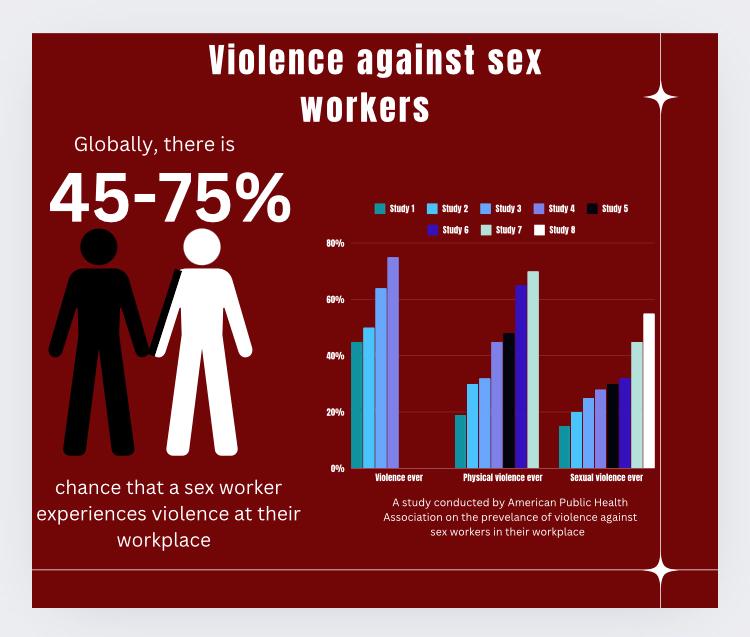
But Policemen are not the only perpetrators of this violence. These sex workers have kidnappers, ritualists, rapists, thugs, and other dangerous criminals in the society to contend with. One of such cases can be seen in a report by Punch that details the horrible death of a sex worker at the hands of ritualists. These horrifying details showing how sex workers are murdered are displayed on social media with no dignity or remorse. It is common for people to assume it is a way to caution people to desist from living wayward lives.

Photo Credit: Punch Newspaper
Sonia goes ahead to tell another bitter tale of abuse that she suffered at the hands of the owner of the brothel. ‘The brother of the owner of the brothel came to see him and he instructed me to take him to my room and take care of him without pay,’ she said.
She is constantly forced to obey what the owner of the brothel says because she has no other place to go if she is thrown out and the crushing fear of paying a ‘fine’ out of the little she earns.
What transpired after letting the owner’s brother into her bedroom left Sonia shocked. “I left him in the bedroom and went into the bathroom to wash up, when I came out, I found out that he used his car keys to punch the condoms I brought out. I immediately asked him to get out of my room and he reported me to the owner”
After receiving this report, the owner asked some group of area boys to flog Sonia twenty strokes of the cane and she also paid a fine of N50,000.
This is the sad story of an average sex worker trying to make a living.

Photo Credit: Nigerian Sex Workers Association
Sonia later joined the Nigerian Sex Work Association, a non-governmental organization established with the key objective to support and empower vulnerable women, particularly those involved in sex work, adolescent girls, and children. She was made a Pre-Exposure Prophylaxis champion through the association. She said she received training on safety and security from the association.
Sonia’s experience on the job is not different from that of Blessing Idoko, 31. She got her own ‘initiation of fire’ from her client. After the usual negotiation, ‘I told I only offer safe sex services which entails the use of condoms and lubricants, and he agreed. After the first round, he removed his condom and demanded my service without them,” she recalls, bitterly. “I declined, and he got so furious. I couldn’t understand why’. She narrated how he struggled with and beat her and still forced himself on her without using a condom. He verbally abused her saying profanities like,’ I paid you therefore, I own you, and I can do as I please with you.’’ I just thank God I did not get infected’, she said.
Blessing Idoko also speaks of times when she has seen non-sex workers get roped in the chaos. “During police raids,’ she says, ‘as long as you are a woman, and you exist in that area you will definitely get arrested” she mutters. This speaks to a gender stereotype often harbored by some misogynists who believe every woman is a potential ‘woman of the street”
An academic study conducted in Abuja, Nigeria, to determine the rate of violence against female sex workers, reported that more than half of these women experienced gender-based violence within six months. Sexual violence was the most common type, while other forms of violence included physical and psychological violence. They also reported that the main perpetrators of gender-based violence are clients, brothel staff, and policemen.
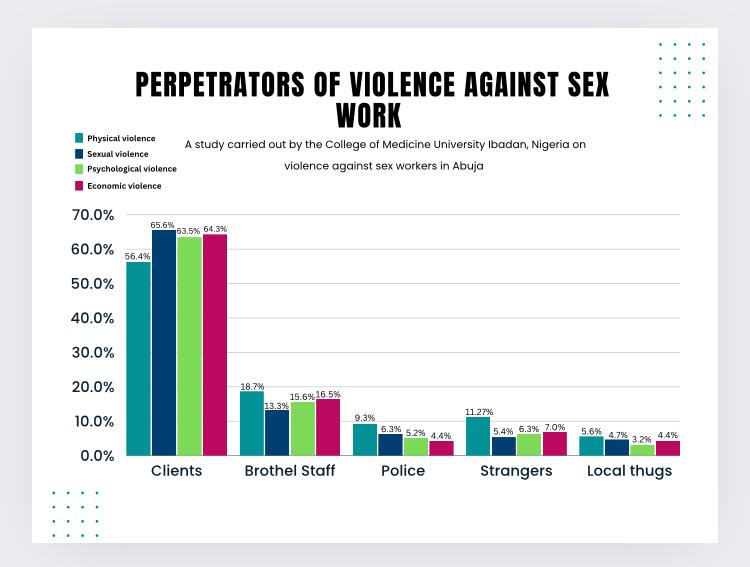
Morenikeji Savage, a lawyer who is also a gender rights advocate discusses the position of the law on prostitution. “It is illegal in all northern States that use the Penal Code and Sharia law (Islamic law). In southern Nigeria, the activities of pimps or madams, underage prostitution, and the operation or ownership of brothels are penalised under sections 223, 224, and 225 of the Nigerian Criminal Code, she emphasised.
According to Savage, the law is adamant about human rights and Nigeria is a signatory to several international treaties and agreements on the protection of human rights. In addition, the Nigerian constitution prohibits discrimination and exploitation based on gender and several policies promote the empowerment of women. She added that although these measures are in place, enforcing the law is a major issue.
There have been several instances where the police get sex workers arrested even when sex work is not illegal in the state and numerous examples of how these women have been denied of their basic human rights.
For instance; in a viral clip posted on 26th September 2023, which trended on most social media platforms, officials of Delta State Government raided a building suspected to be a brothel and arrested many young women labelled as sex workers.
On the account of an X user, @sabiradioonline, someone was saying to the young ladies: “don’t cover your face”. It was alleged that illicit items were recovered from them in their quarters in Sapele, Delta state, South-South Nigeria

Photo Credit: @sabiradioonline on X
On May 2019, officials of the Federal Capital Territory Administration (FCTA) raided a popular night club, Caramelo, and arrested 34 women. A popular gossip blog “Instablog9ja’’ reported that the ladies according to preliminary investigation, were strip dancers and not commercial sex workers as alleged by the Police

Photo Credit: Instablog9ja
Two weeks later, the internet was awash with trending story of the arrest of another set of 70 women from different nightclubs in Abuja and detained at the Utako Police Station. The assault did not end there, they even raped the women. A sex worker who was allegedly arrested that night gave a detailed account to Sahara reporters, saying ‘they were raped by the Police who wore pure water sachets instead of Condoms’.

Regarding this crime against humanity, the Federal High Court judge in the FCT, Binta Nyako, ruled that sex work is not a crime, and she ordered the respondents to pay N1.6 million as damages to the affected women.
It also raised alarming concerns on the international scene. More than Seventy-two women organizations, activists, scholars, civil society, and human rights organizations in Nigeria strongly condemned this raid and the sexual harassment that followed.
SURVIVING AS COMMERCIAL SEX WORKERS
“Many women turn to sex workers out of economic necessity; as a means of survival and to support their families’, she says. ‘’Secondly, there is limited access to education and high unemployment rates, often exacerbated by gender discrimination, which leaves women with few options. Sex work can become one of the only ways to achieve financial independence in these situations,’ says Amarachi (not her real name), the National Coordinator for the Nigerian Sex Workers Association
She said survivors of sex trafficking often remain in sex work due to lack of alternatives, the psychological and social impacts of their trafficking experience. They may find it challenging to reintegrate into the society and secure traditional employment, leading them back to sex work as a means of survival. Likewise, marginalized groups, such as LGBTQ+ individuals, migrants, and ethnic minorities, often face systemic discrimination and barriers to traditional employment, having sex work as a more accessible option.
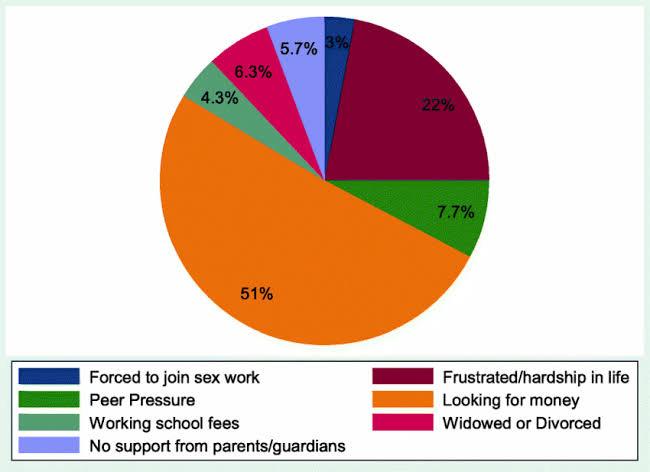
Photo credit: International Union of Sex Workers
TRIGGERS OF VIOLENCE
In a qualitative enquiry in Kenya, it was uncovered that sexual and physical violence was pervasive among female Sex Workers and that it was commonly triggered by negotiations around condom use and payments. Not only that, other triggers are pressing financial needs, gender-power differentials, the illegality of trading in sex, and cultural subscriptions to men’s entitlement to sex and money. These triggers show universality of violence against sex workers and at large, gender based violence.
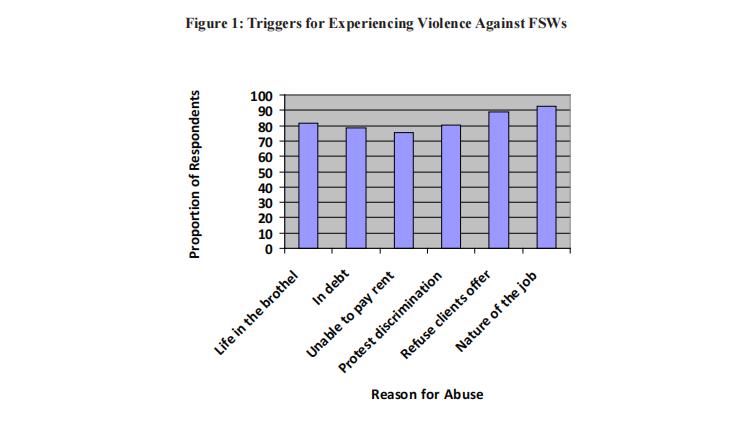
Photo credit: An image from an academic study conducted in Abuja
VIOLENCE AGAINST FEMALE SEX WORKERS IS VIOLENCE AGAINST ALL WOMEN
Kiki Mordi, the CEO of Document Women, a curative media platform dedicated to battling erasure by documenting women’s stories, speaks on why she believes that violence against female sex workers is violence against all women. “This is because this violence is synonymous with the notion that it boxes women and ascribes respect based on societal constructs’, she observes. A woman is just one accusation away from being a sex worker anyway and it is not even about the way they dress. A bias harbored, lives on” She explains.
She believes that no profession is safe for a woman and that many times, even female bankers, online vendors, social media content creators, and others were accused of being sex workers because they were women.
As a founding member of a feminist coalition in Nigeria, Kiki affirms that this violence must be taken as a feminist issue. She wonders if male sex workers are treated the same way as their female counterparts; ‘If the answer is ‘No ’then it becomes a feminist issue. Men are not just guilty of violence against sex workers, they are also the main customers of sex workers. Yet, they are nowhere to be seen when the police intrusion happens” she asserts
According to her, the root of any gender-specific problem stems from the fact that society does not see women as equal to men. They do not see women sex workers as equal to male sex workers, they do not see women as equal to their counterparts. Kiki proffers gender equality as a crucial solution to the brutality female sex workers face. She further explained that violence represents the broader misogyny and sexism that affect all women, regardless of their occupation.
Savage on the other hand underlines decriminalisation as a way the law can be used to mitigate this violence “Sex workers often face violence due to the stigma and criminalization associated with their work’, she explains. ‘While no federal laws in Southern Nigeria explicitly criminalise the sale of sex, the vague policies are against sexual commerce. It does not stop decriminalisation’. She insists that the justice system must ensure that sex workers have equal access to justice when crimes occur, and this is very crucial. This includes very good effective investigation and stern prosecution of crimes committed against sex workers, as well as measures to prevent further victimisation of sex workers during legal proceedings
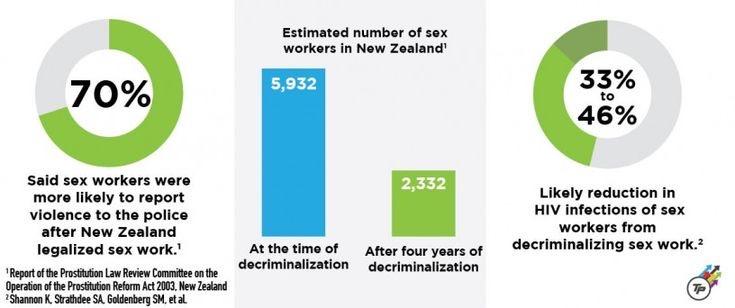
Photo credit: A study on the Global epidemiology of HIV among female sex workers
Creating economic opportunities and social programs to provide alternative livelihoods for sex workers who wish to leave the industry was a proffered solution by many researchers. A study run by the College of Medicine University, Ibadan tells us that about half (148 or 48.4%) were willing to leave the job if they were given an alternative source of income. Of this group, 23.0% were willing to be traders, 23.0% wanted to go back to school, 11.5% would like to have a shop of their own where they could be hairdressers, tailors, or caterers, 8.1% wanted to work in an office, while 20.9% would like to get married and be homemakers. Grassroot education has also proven to be a key to eradicating this violence. A study aimed to assess the impact of grassroots invention records that there were higher reports of gender-based violence among female sex workers after the grassroots intervention than at the baseline, in which most cases of violence were underreported.
ENDING STIGMA FOR SEX WORKERS
After decriminalisation comes destigmatisation, even after the law is gone, women are still prone to harm if stigma continues to pollute our society.
Amarachi, the National Coordinator for the Nigerian Sex Workers Association, proposes ways the stigma for sex workers can be stifled in our society:
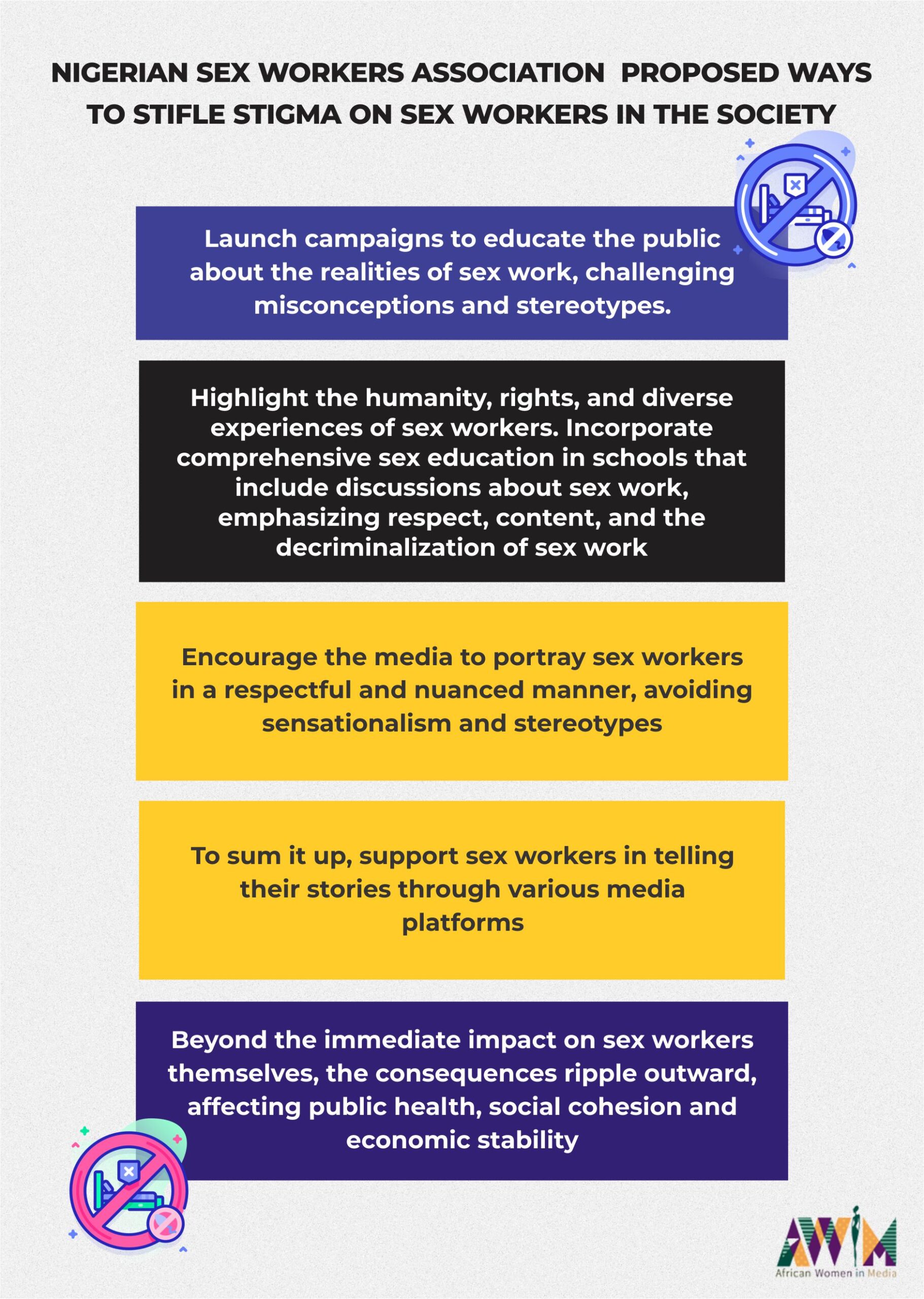
The Nigeria Federal Ministry of Health, HIV/STI integrated biological and behavioral surveillance survey conducted in 2007 shows that over one-third of sex workers in Nigeria are infected with HIV, and in some cities, 50% of all brothel-based sex workers are HIV-infected. The stigma that plagues sex workers make them unwilling to go to hospitals even though they are more vulnerable and experience many more health risks. When asked for her opinion about this survey, Sonia, one of the sex workers interviewed by AWiM news confirmed that healthcare practitioners increase the price of the fee once they notice you are a sex worker, or they start to treat you differently.
Sandra Okpara, a clinical chaperone and health communications strategist, said it is important that female sex workers have access to healthcare confidentially, without the fear of judgement. “These risks do not just affect sex workers; they pose a broader threat to community health and well-being’, she said.
Derby, a mental health specialist suggests ways a traumatised and abused sex worker can heal. She said healing is a process which starts by accepting and admitting that you need help. ‘That is when one is more inclined to seek solutions’, she said.
As a mental health specialist, Derby suggests sex workers need to adopt certain coping mechanisms and stress management techniques like crying; as weird as it sounds, she says it is an effective coping mechanism. It helps to actually express certain emotions. And in cases specific to this, it’s important for them to know that it is okay to cry.
Another one is being in a supportive network; family, friends or generally people who are not toxic to their mental health. She says it is best to surround oneself with love or people willing to help. “There is also something we call PMR (Progressive Muscle relaxation]’. She explained that it is a form of therapy which involves tightening and relaxing of the muscle groups, one at a time, in a specific pattern.
Editor’s Note: The names of the survivors have been altered in this report for their security.
This story is part of the African Women in Media (AWiM) ‘Reporting Violence Against Women and Girls’ project, supported by the Wole Soyinka Centre for Investigative Journalism.
We’re not gonna spam. We’ll try at least.

Copyright 2020. African Women In Media
Copyright 2020. African Women In Media
Recent Comments